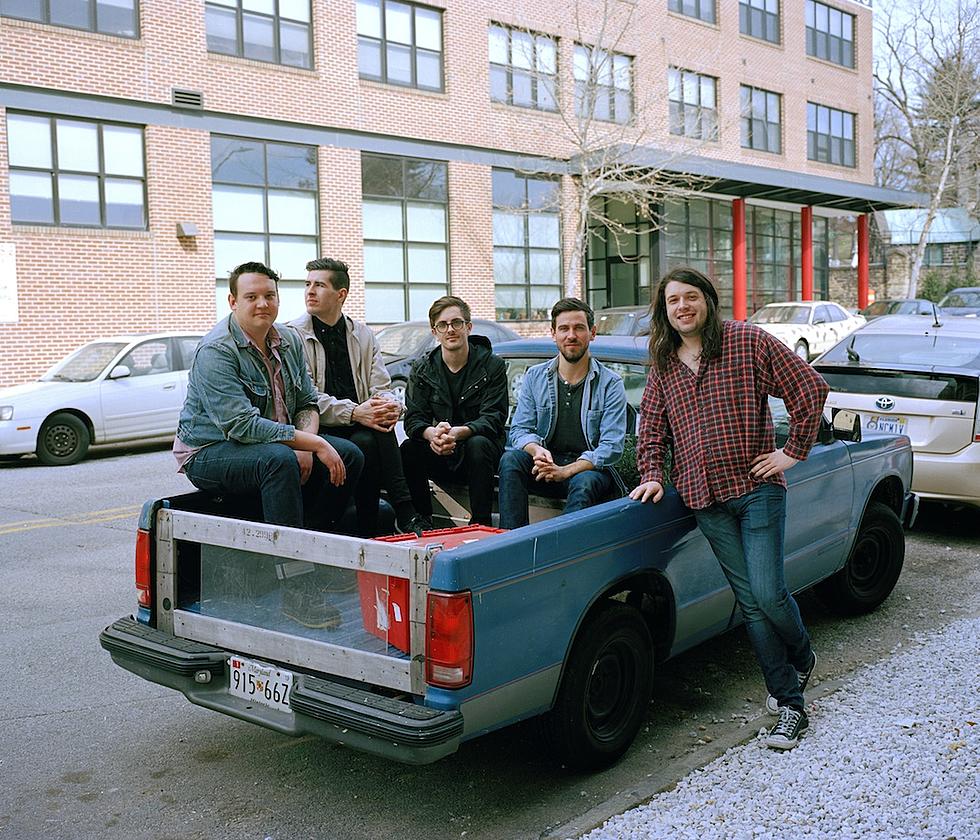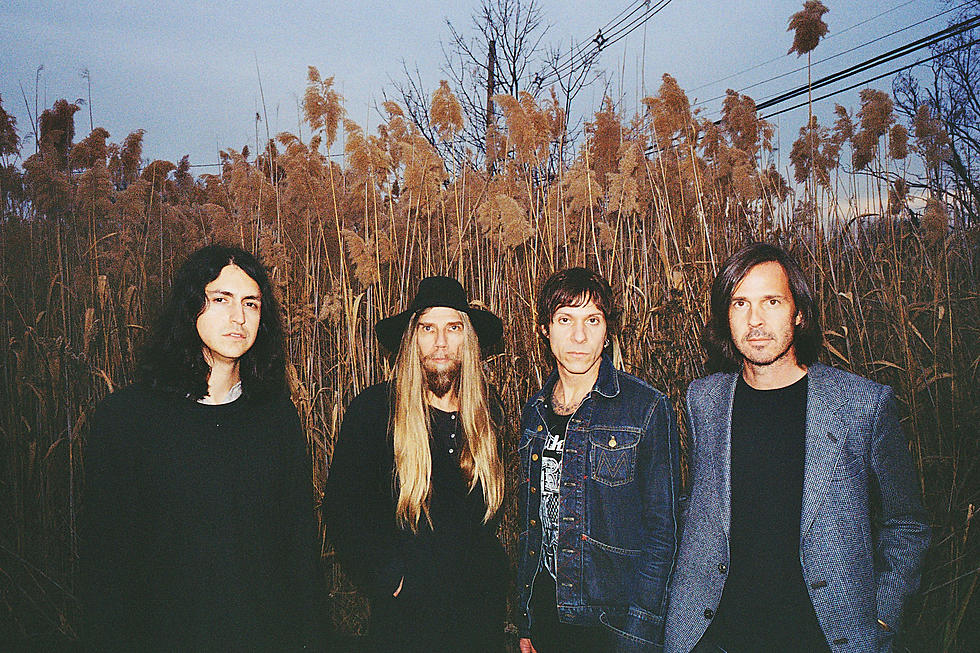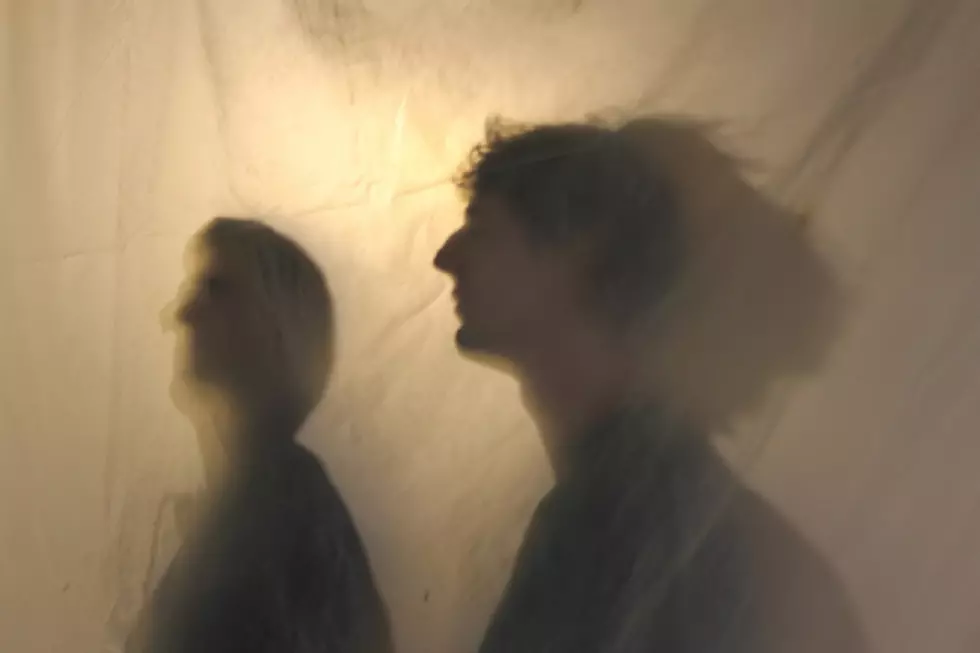
Dude York Extol the Virtues of Kiss-Offs, Frank Ocean, Retail Therapy
Dude York are gearing up to drop their new album, Sincerely, next week via Hardly Art. True to its title, the record finds the Seattle trio at their most honest, churning out taut, no-bullshit rock songs with a confessional bent. These are grungy accounts of loneliness, heartbreak, anxiety and existential boredom. Bummed-out as those topics may be, the band never gets caught up in the gloom — previously shared tracks like "Black Jack" and "Tonight" relay tales of woe with shit-eating grins, giving them the definitive last laugh.
Dude York — whose lineup consists of guitarist / vocalist Peter Richards, bassist / vocalist Claire England and drummer Andrew Hall — are just as open in person, not to mention downright silly at times. They approach interviews like an group hangout-cum-brainstorming session: cracking jokes, bouncing ideas off each other as if in a ping-pong match, and even coming up with questions of their own. Needless to say, when we called up Dude York to discuss Sincerely, it made for one hell of a chat. Stream the new album in full below ahead of its release, and read on for CLRVYNT's conversation with the band.
Sincerely is out February 24 via Hardly Art. Pre-order it here.
A lot of Sincerely deals with mental health. We’re living in real crazy times. You guys are about to go on tour soon, so I just wanted to ask you how you’re doing, to do a mental health check-in — because I think we need to be doing a lot of that across the board.
Andrew Hall: I’ve been buying a lot of things I shouldn’t be buying. And I’m just trying to exercise a lot. And sometimes I try not to look at the internet, but it doesn’t go that well.
What kind of stuff have you been buying?
AH: Uh, mostly shirts. And, yeah, other objects I should not be purchasing. I don’t know. I’m not sure if it’s comfort shopping or depression shopping or neither. It’s something! And at some point I need to buy a new blender, because mine died. I’m gonna shut up now!
So, I have a question for you, Claire. I know this is the first Dude York record where you contributed your own songs and sing lead vocals. Was it nerve-wracking at all, coming forth with these tracks to share with your bandmates?
Claire England: It was super nerve-wracking. I didn’t really plan on doing it. We were just sitting, just trying to have a rap session about new songs, like, "What has anyone been working on?" Just sitting with acoustic guitars. And I had this song "Tonight." I had kind of pieced it together over years; I had parts of it. And I realized it was a whole song. And I played it for them, and I was very nervous about it. But they really liked it a lot. So, I felt better about it. And that was very encouraging. So, I was like, "Oh, here’s another one, too, I guess."
Do you guys feel like your identity has shifted? Does this feel like a different band now that you have this different songwriting aspect involved? Because, Andrew, you did most of the songwriting in the past, yes?
AH: I rewrote lyrics on two songs. Peter brought in a lot of songs. And we kind of bang through a lot of things together. It was probably less collaborative at that point than we are now.
Peter Richards: Andrew has always been the most crucial sounding board for ideas and writing and et cetera. I don’t trust my own voice without his input. It feels now like everyone is searching the same amount of hard for good ideas for the band. Everyone is turning out their pockets for the best riffs.
You originally recorded Sincerely at home, but that version of the album had a lot of drywall on it, so you had to scrap it and rework it. Can you tell me more about that, and how the record changed as a result?
AH: So, we made a wacky home-recorded version of this record with a lot of synths and doo-wop harmonies that might come out as a cassette at some point in the future, if we’re feeling adventurous some day. When one of us figures out where the files are and the computer runs fast enough to do something with them. Which doesn’t really happen anymore. All of our computers seem to be cursed. So, yeah, we made a really weird version of this record, and the person who tried to mix it just said, “You can hear drywall in all the vocal takes.” No matter how we looked at it, it just wasn’t quite right. So, we played a show that summer, and we were kind of collectively uncertain as to what to do. And Cody Votolato [Blood Brothers, Cold Cave] saw that show and said, “I want to record you.” He also played that show, and then we hung out a couple of times. He came to our practice space and said, “Oh, John Goodmanson is gonna come listen to the songs today.” And we said, “Oh! Okay!” He listened to the songs, and four months later we made a record in a real room, which was a nice thing to do. It went quickly and everyone was very kind.
What kind of art were you consuming during the period of time you were writing the record?
PR: The first thing that comes to mind, for me, is Channel Orange by Frank Ocean. I don’t remember anything before Fetty Wap. Except for Frank Ocean. [Laughs]
What about that album stands out to you?
PR: Well, I mean, there are so many different ways to enjoy those songs. But for me, the moment of catalyst, where I was like, "I know I’m charmed by this, and I’m gonna listen to this as long as I can until I’m dead," is the way it opens with a TV turning on. And then the Street Fighter starting sound. And for me, that was the portal into his universe. And I just felt like, whenever I heard that, I knew what was gonna happen. And I knew that my interest as a consumer of music was being taken care of. As clinical as that may sound, that intro is really exciting for me in kind of embarrassing ways. I hear the other songs from that album, like "Pyramid" or "Pink Matter" or any of those songs, and I think about that and I remember being like, “Oh yeah, I love this.”
"Tonight" captures so many people’s feelings about relationships that have gone sour. How do you go about approaching writing about your personal experiences in a way that doesn’t seem self-pitying, like a cheap shot at somebody else?
AH: Writing a lot of self-pity and taking a lot of shots, but then hearing what the other people are bringing to the table and rolling with their criticism, and moving on from those first takes and trying to get empathetic and exciting material. It isn’t easy. You need to write a lot of stuff in order to get there, I think is the real trick to it.
CE: I also think that break-up songs are first and foremost always about the person who’s speaking. So, it’s usually not so much about the other individual. It’s about the feeling you were having going through it. It’s personal.
PR: That’s cool. Are you also saying, Claire, that the context of a break-up song reveals more about the narrator than it does about the situation in play?
CE: I don’t know that that’s what I’m saying, but I think it makes for a more interesting song than just being like [affects southern drawl], “This guy cheated on me and I hate him.”
I mean, look at Drake. That’s what he does. The way he talks about his exes — the whole concept of taking a voicemail from your ex and incorporating that into the song. Whew! That feels almost vindictive. But you can argue that he has just as much ownership in the story as his other partner; he's just in a position where he can leverage it.
AH: You can give somebody 50,000 new Instagram followers.
CE: I think the process of writing those songs is about dealing with the feelings yourself, versus trying to do something vindictive. Ideally! Certainly there are other songs. But hopefully.
Have you ever been romantically entwined with someone who asked you not to wrote a quote, unquote “mean song” about them?
CE: No one’s ever asked me that, but also, this album hasn’t come out yet.
AH: If someone asked me that, I would laugh in a kind of flattered way, and then think about it later as a challenge. And write a bunch of songs about them. I think as a band, we gravitate to sad music.
CE: I think we like sad music that sounds happy. I think we like the sneaky sad music.
AH: "Up the Junction" by Squeeze. So beautiful and so natural. I think it’s very hard to write a happy song with singing in it. People sing when they’re happy under very specific circumstances: because God told them to, or you have, like, a headache.
PR: Andrew, do you think a song like [Percy Faith's] “Theme From a Summer Place” is inherently happy?
AH: Uh, that’s neutral. I can’t think of that necessarily as being happy or sad. When I think about Jasper from The Simpsons singing it, it makes me happy, but melodically I’m not sure. I think it’s neutral. It makes me think of that episode of Freakazoid! called “Relax-O-Vision,” where all the violence is replaced by stock footage and "Theme From a Summer Place" plays in the background.
More From CLRVYNT









